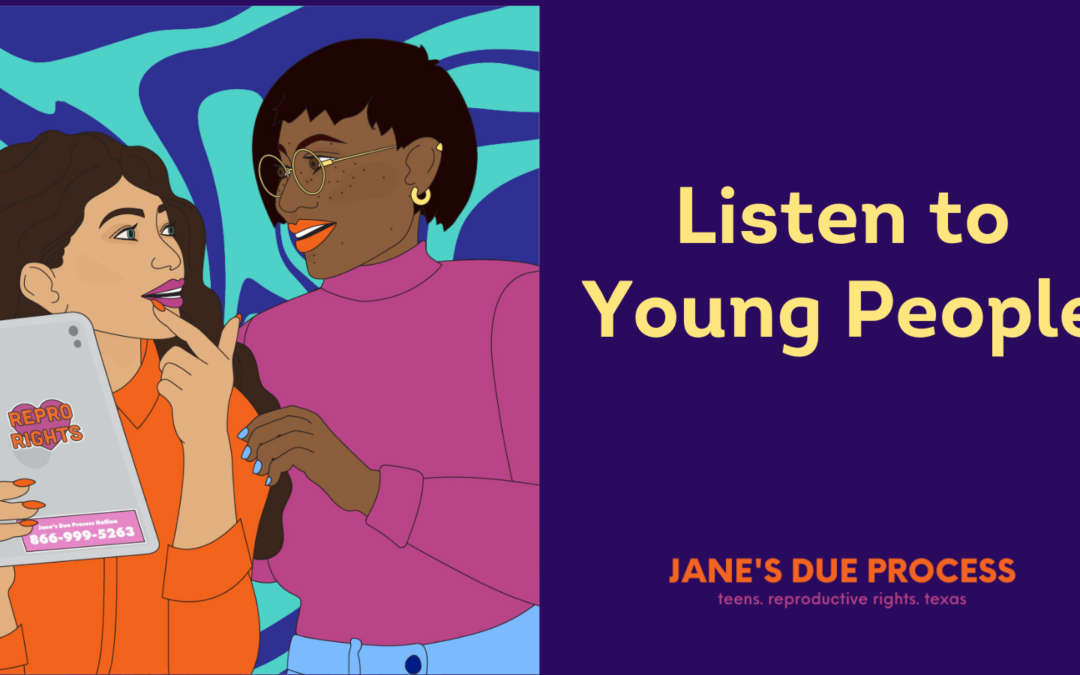Over the summer of 2021, Texas high school student Anwita Siddavatam joined Jane’s Due Process as a digital communications intern. We recently caught up with Anwita to see what she’s up to and how her time with JDP impacted her advocacy for reproductive health, rights, and justice.
JDP: What inspired you to contact an abortion fund like JDP to get involved as a 15-year-old high school student?
Reproductive justice is an issue I’ve personally been passionate about for quite a while, and as I saw the government continuously try to restrict not only access to abortion but access to contraception and accurate and comprehensive sex-ed, I didn’t feel right to sit back and watch, especially knowing that most of these laws and bills being passed affected young people of color like me the most. I’d been following the work of JDP for a while, and reached out because it was one of the few organizations I knew dedicated to serving young people specifically. At the time I reached out to JDP, I knew nothing of reproductive justice advocacy. I was just a 15-year-old that wanted to put her passion to good use and make a difference in her community. Reaching out to JDP was such an impromptu decision, and I had no idea the work I would do with JDP would go on to reach so many people, but it is definitely one the best decisions I’ve ever made.
JDP: What had you done for abortion advocacy prior to reaching out to JDP to get involved?
Prior to reaching out to JDP, I had been working on a personal initiative that I still run today that works to destigmatize abortion and serve as a source for medically accurate and accessible information and education on reproductive health. I noticed how a vast majority of people against abortion were people speaking on misinformation and misguided reasonings which greatly contributed to the stigma surrounding abortion and sexual and reproductive health in general. To destigmatize was to create a space for stories to be shared and for the right information to be presented, so with this idea I founded the Reproductive Freedom Network, tRFN, a youth-led community organization that covers a range of topics relating to reproductive health and rights. Our mission is to create a space to have meaningful and inclusive conversations surrounding abortion and to empower people to feel in control of their own reproductive health.
JDP: How would you like to expand your work in abortion advocacy and educate your peers in your final year in high school?
I would really like to bring light to the polarization between the pro-choice and pro-life movements because while I believe in safe, legal, and accessible abortion and the right to choose, I think it’s important for us to recognize that the heavy divide between the two movements is heavily due to the heavy politicizing of the issue when in reality this is an extremely personal, medical issue. Though there shouldn’t be room for compromise in terms of abortion care, I do believe that there are many bipartisan efforts the majority of people can get behind in terms of general reproductive health like comprehensive sex-ed, access to contraceptives, and improved pregnancy resources. With the recent overturning of Roe v. Wade, however, I think at this time the most important piece of my abortion advocacy comes down to educating not only my peers, but my community on why legal abortion is important and necessary.
JDP: What’s the greatest lesson you’ve learned as a youth organizer?
I think the greatest lesson I’ve learned is to never underestimate the value of even the smallest organizations or actions. At first, I didn’t think much would come out of the posts I was creating, but the number of people that some of these infographics have reached and the connections and opportunities that have come from my work with JDP have been incredibly overwhelming. The smallest action from reaching out to JDP over social media has led to me creating content that millions of people across the country are seeing and benefiting from and to me working with the Texas Women’s Health Caucus on future women’s health policy and legislature.




